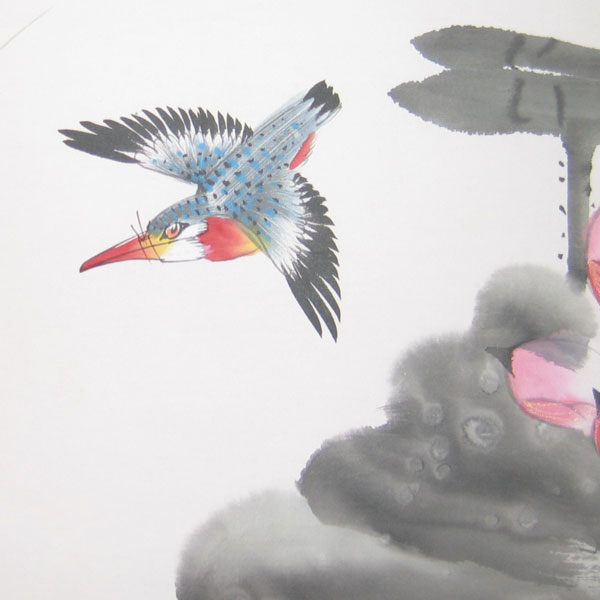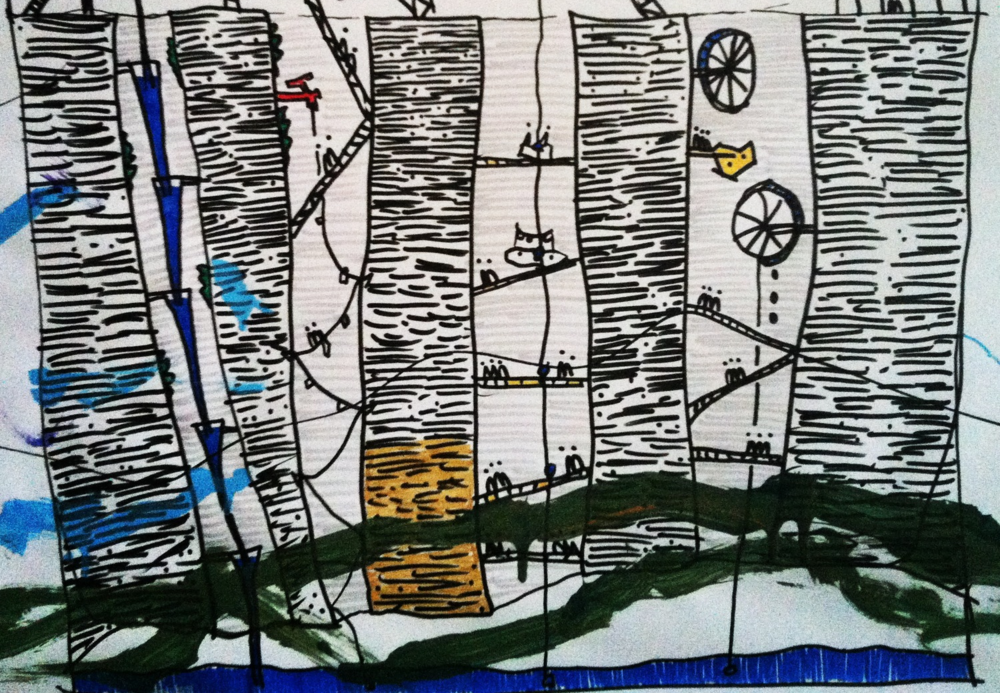But Yes.
Swampy Cree narrative poem
translated by Howard Norman
I stay awake.
I am the poorest one.
I cook bark.
I have bad luck in hunting.
A duck caught my arrow
and used it
for her nest.
I am the poorest one.
I sit in mud and weep.
I have bad luck in hunting.
A goose caught my arrow
and broke it
in two.
I am old, old.
Don’t bring me pity,
but food
yes.
Never Too Late
Starting the Spring Garden and Thinking of Thomas Jefferson
by Gary Snyder
Turning this cloddish soil still damp and cold
with a heavy curved crofters spade
finally I’ve read the life of Thomas Jefferson
here we are about the same age
— eighty — except I’m living alone with my dog
and spading a tiny spring garden
and he had hundreds of workers
on the farm and fixing the house while he
mostly wrote letters and thinking — thinking
true democracy is to help everyone
do for themselves. Which means
we must think with the help of the whole
neighborhood, bullshit detectors in place but
cleanly and clearly forgiving
— to be free is to get past too much lonely stubborn
deluded private thirst for what?
for things? for some small perk?
So give and take. Where was Jefferson in this — I wonder —
whacking clods, tossing clumps of winter grass roots
to the side
scooping out and heeling in some Asian aubergine
— the long thin kind you grill with grated ginger
Everyone free to decide to join in on the work
and the play
empowered to be free of “me”
in a world which both has and has not
hierarchy. But he had slaves
and never thought that through.
& Tom had friends like Madison and Adams
to honestly argue him down and explain
the cracks in his dream;
Now — out on the far west coast of the continent
this rough mountain pine tree land
two hundred years later,
putting another turn on
whatever he thought we could do
Tom Jefferson: never too late,
never be through,
you always can pick up a hoe —
let your people go —
We Keep Looking
This Tenderness
from Things that Join the Sea and the Sky: Field Notes on Living, by Mark Nepo
We keep looking for a home though each of us is a home. And no matter where we run, we land before each other, thoroughly exposed. This is the purpose of gravity — to wear us down till we realize we are each other.
Though we think we’re alone, we all meet here. Though we start out trying to climb over each other, we wind up asking to be held. It just takes some of us longer to land here than others. Once worn of our pretense, it’s hard to tolerate arrogance. Once humbled, it’s hard to withstand a litany of “me.” Once burning off the atmosphere of self-interest, there’s a tenderness that never goes away.
This tenderness is the sonar by which we sense the interior life. This tenderness is the impulse that frees us. For anything is possible when we let the heart be our skin.
The point is to feel whatever comes our way, not conclude it out of its aliveness. The unnerving blessing about being alive is that it can change us forever.
I keep discovering that everyone is loveable, magnificent, and flawed.
Soften. Widen. Include It All.
 Ajahn Sucitto has a new talk, called The Practice of Inclusivity, that I’ve listened to a couple of times now (and surely will listen to a couple of times more) because it just keeps speaking to me, on so many levels.
Ajahn Sucitto has a new talk, called The Practice of Inclusivity, that I’ve listened to a couple of times now (and surely will listen to a couple of times more) because it just keeps speaking to me, on so many levels.
He begins: “I’ll offer some reflections, some thoughts…. straight from the heart:
“When I began to practice, I began in a highly structured way. I was using the Burmese satipatthana system, which is quite a carefully tooled, structured system. I hadn’t done any meditation at all! So I went from nothing to that. [laughs]
“Then because I felt I needed some structure in my life, after the class was over, I said to the monk who was teaching (this was in Thailand): Can I go to the monastery? Because I felt the structure there would keep me focused. Otherwise it was just going to dissipate. He said: Yeah, you can go. It’s free. Just show up.
“So I packed my stuff, sorted my things out, and went down the road to the town where the monastery was and they said: OK. Here’s this little hut you can live in. You’ve got to keep these eight precepts…. It was solitude. No eating in the afternoon, no entertainments, celibacy… You know, the “thing.” So that was Day 2 of my meditation career. [laughs]
“And I thought, yeah, maybe a week of this and I’ll sort things out, and get back on the road. And after a week or so, I thought: Hey, I can sit still for 5 minutes. I’m nearly there! (Because I hadn’t sat still for 5 minutes in my life at all.) And then after a while I thought: Uhh, this might take a little longer. Maybe 3 months. And then: Well, it doesn’t seem to be quite settled yet, but probably a little longer should do it.
“So then it was 3 years that I was in this hut. In solitude. It was structured in terms of the meditation. And in a structured situation….”
From there Sucitto goes on to tell how after 3 years of practicing with great diligence, his father dies, so he goes back to where his mother is living in England, and finds that his practice — without the structure he’s been used to — completely falls apart. So he decides to join Ajahn Sumedho at a small monastery in London. He tells how the communal living situation was quite helpful to him, but this time, as far as the teachings were concerned, there was very little structure at all. Ajahn Sumedo’s instructions were:
Sit there. Everything that arises, passes away. Be with that.
Sucitto askes: But how do you mediate?
Sumedho says: The thought: “How do you meditate” — notice that it arises, be with that, it will pass.
So there was very little structure to the practice. “But what was provided was a community structure. You lived together; you operated together; you had certain loyalties and affiliations to the teacher, to the other people in it — it was only a small group. So you were held within that. And you were held within a larger structure, which was all the lay people who would come round and help to hold the thing together. So there was a communal structure, a living structure. So gradually over time, that sort of began to replace my early structure.
“Then as I shifted, or as my mode of practice began to shift of its own accord, I thought: How would I try to sum up how to meditate? One day I had to go and teach a retreat. And I was in the shower and I thought: How do I meditate? (Showers are great because then people leave you alone. And you’ve got nice, soothing water running down!)
“So I thought: Well, you pay attention. You definitely pay attention. Yeah. And as you pay attention, then: You begin to widen and soften your attention. Yeah. And then: You meet what arises in your mind. Yeah. Meet what arises. Just meet it.
“And then as you get that underway, as you begin to meet stuff rather than react to it, shut it down, run away from it, proliferate on it, complain about it, identify with it, blame it on somebody else, blame it on yourself, try to sort it out in your head…. you just meet it.
“And as that becomes more available: Include it all.
“So you keep widening to include it all. Which means it comes into your day. As a model of how I practice — yeah, that’s about it. Then after years of just sensing that and practicing with that, the words “meet what arises” and “include it all” began to take on a larger significance.
“I was still operating within the boundaries of what I call “my mind.” My thoughts: I include all that. My reactions: Yeah. My emotions: I include all that.
“Then, as I began to include all that, I recognized there was something else I was leaving out. Which is: Other People. How they are. What’s happening for them. I decided I wanted to get interested in that. Learn to be still with them; pay attention to them; meet what arise in that; soften, widen, open my heart; meet what arises; whatever they’re experiencing — meet that. Include that.
“Rather than determine that they should be different; or give them a pill; or tell them to go away… You know: strategies. (Like: fix them; change them; even understand them.) Don’t bother! Just meet what arises; widen, soften; include it all. And see what happens with that.
“And through that I began to recognize just how many boundaries there are to cross. How many places or boundaries marked by fear, marked by people’s nervousness, marked by people’s criticisms of themselves and others, marked by people’s traumas, where they feel they can’t go, they’re not allowed, they’re not OK, there’s something wrong with them. These familiar boundaries that arise for people. Where they’re not being included.
“As I began to teach more, listening to people, more and more I began realizing: everybody’s feeling there’s something wrong with them and that they’re the odd one out. Or that they’re not included.
“They’ve been excluded by: the society, their parents, their partners, their health, their race, their gender… There’s something where they’ve been shut out. And they’re hurting because of that.
“So I began sensing that and not even fixing it or changing it or giving any anesthetics or sedatives (like: Don’t worry about it). But just meeting the pain. Of people’s hearts at this place of exclusion. And including that. And witnessing that.
“Then I thought: where does all this happen? When one realizes it’s so beautiful… It’s so beautiful, it’s so transformative, when we can — either within our self or with others — just be at the place of meeting. And widening. And including. And not naming, changing, fixing, analyzing…. Just including. What happens with that?
“So I’ve spend about twelve years doing this approach quite consciously with other people. Just to focus on that, notice what happens when we just sit together in presence and what arises. Whether it’s the agitations, the fears, the sense of what do we think about each other, the feelings of I’m not good enough for you or you think you’re not good enough for me, or we’d better keep talking and making something happen because we feel nervous, or you know…. Whatever. Just meeting that and letting that arise and pass.”
***
The talk, of course, goes on from there. I just wanted to give you a taste. The text is edited, mostly for readability. I strongly recommend you listen for yourself. (He has an accent. And he mumbles. But just get used to it.) He really does speak, as he says, “straight from the heart.” Which is so beautiful. Also, make sure you get all the way to the part at the end where he talks about what he means by citta, and how he has come to understand it as…. Well, listen to the talk and find out! Click here. (Start at the very beginning. It’s less than an hour. It’s so worth it.)
But First We Must Watch
Singapore
by Mary Olive
In Singapore, in the airport,
a darkness was ripped from my eyes.
In the women’s restroom, one compartment stood open.
A woman knelt there, washing something in the white bowl.
Disgust argued in my stomach
and I felt, in my pocket, for my ticket.
A poem should always have birds in it.
Kingfishers, say, with their bold eyes and gaudy wings.
Rivers are pleasant, and of course trees.
A waterfall, or if that’s not possible, a fountain rising and falling.
A person wants to stand in a happy place, in a poem.
When the woman turned I could not answer her face.
Her beauty and her embarrassment struggled together, and neither could win.
She smiled and I smiled. What kind of nonsense is this?
Everybody needs a job.
Yes, a person wants to stand in a happy place, in a poem.
But first we must watch her as she stares down at her labor, which is dull enough.
She is washing the tops of the airport ashtrays, as big as hubcaps, with a blue rag.
Her small hands turn the metal, scrubbing and rinsing.
She does not work slowly, nor quickly, but like a river.
Her dark hair is like the wing of a bird.
I don’t doubt for a moment that she loves her life.
And I want her to rise up from the crust and the slop and fly down to the river.
This probably won’t happen.
But maybe it will.
If the world were only pain and logical, who would want it?
That Which is Exhausted by Vision
Visual Orders (excerpt)
by Jenny Xie
[11]
Ancient optic theory dictates that the eye sends
out rays, which touches the object of sight. When
the visual ray returns to the eye, the image is impressed
on the mind. To see, then, was tactile.
That we are touchable makes us seen.
[12]
Sight is bounded by the eyes,
making seeing a steady loss.
The presence of the unseen is vaster
than that which is exhausted by vision.
We inhabit this incoherence.
Happily Ever After, and Even After That!
At Sunday Sangha last week we got into a discussion about the fact that of course we “cling” to our loved ones (spouses, children, grandchildren, etc.). And Brian mentioned that at a recent retreat, Bhikkhu Bodhi pointed out that while many of the Buddha’s teachings were given to monastics, many of them were not — they were given to “regular people,” who were married and had children, etc. — and that it’s important to know who the Buddha was talking to when we try to understand these teachings.
Which brought to mind the sutta where the Buddha tells Nakulapita and his wife Nakulamata how they could stay together and in love with each other as long as they lived….and on into future lives as well!
“This discourse also shows that far from demanding that his lay disciples spurn the desires of the world, the Buddha was ready to show those still under the sway of worldly desire how to obtain the objects of their desire. The one requirement he laid down was that the fulfillment of desire be regulated by ethical principles.” (from In the Buddha’s Words, by Bhikkhu Bodhi)
Here’s what it says in the sutta:
“One morning the Blessed One dressed, took his upper robe and bowl, and went to the dwelling of the householder Nakulapita. Having arrived there, he sat down on the seat prepared for him. Then the householder Nakulapita and the housewife Nakulamata approached the Blessed One and, after paying homage to him, sat down to one side. So seated, the householder Nakulapita said to the Blessed One:
“Venerable sir, ever since the young housewife Nakulamata was brought home to me when I too was still young, I am not aware of having wronged her even in my thoughts, still less in my deeds. Our wish is to be in one another’s sight so long as this life lasts and in the future life as well.
“Then Nakulamata the housewife addressed the Blessed One thus: Venerable sir, ever since I was taken to the home of my young husband Nakulapita, while being a young girl myself, I am not aware of having wronged him even in my thoughts, still less in my deeds. Our wish is to be in one another’s sight so long as this life lasts and in the future life as well.
“Then the Blessed One spoke this: If, householders, both wife and husband wish to be in one another’s sights so long as this life lasts and in the future life as well, they should have the same faith, the same moral discipline, the same generosity, the same wisdom; then they will be in one another’s sight so long as this life lasts and in the future life as well.” (AN 4:55)
***
How sweet is that!
Which Is Always Beaming in All Directions
The Dilation of What Seems Ordinary
from Things that Join the Sea and the Sky: Field Notes on Living, by Mark Nepo
Just now, it happened again. My defenses were down, my memory machine asleep, my dream machine tired, and so the Mystery — which is always beaming in all directions — made it through. And the moment of clarity the Mystery releases is always like a return from amnesia. So this is what it means to be a person, how could I forget: To be alive, to look out from these small canyons called eyes, to receive light from the sun off the water and feel it shimmer on the water in my heart. To listen to the silence waiting under our stories, long enough that all the vanished words said over time simmer together to make me feel journeys beyond my own. Till I surface before you with a humbled sense of happiness. Not because I’m any closer to what I want, or even know what I want. But because in the flood of all that is living, I am electrified–the way a muscle dreams under the skin that holds it of lifting whatever needs to be lifted.
And So On, And So Forth
Zazen
by Jenny Xie
Sour tobacco, tofu bowl, bright.
Planks of hollyhock in Anhui,
the way I don’t know could open
months later like a hive.
Hard tide of shame that I thought
had dried out years ago.
Love’s barks grow watery, faint.
I walk the edge of an honest life.
The lash of carnal thoughts, followed
by the thin whip of banal guilt.
Hot yellow lights of cities
where I once pressed, over and over,
up against alternate lives.
Now, I sit. Above a deep ground.
The mind fetches the chatter.
And so on, and so forth.
There Will Come a Time
 This is what I have learned from working with my dharma friends on Waking Up to Whiteness: It’s necessary to recognize the reality of racism; it’s important to want racism to end.
This is what I have learned from working with my dharma friends on Waking Up to Whiteness: It’s necessary to recognize the reality of racism; it’s important to want racism to end.
But it won’t end until: “I’m not a racist,” turns into: “I’m antiracist. Antiracism is one of my core values. My actions in the world are based on that.”
In support of which, I offer this except from Stamped from the Beginning: The Definitive History of Racist Ideas in America, by Ibram X. Kendi:
“An antiracist America can only be guaranteed if principled antiracists are in power, and then antiracist policies become the law of the land, and then antiracist ideas become the common sense of the people, and then the antiracist common sense of the people holds those antiracist leaders and policies accountable.
“And that day is sure to come. No power lasts forever. There will come a time when Americans will realize that the only thing wrong with Black people is that they think something is wrong with Black people.
“There will come a time when racist ideas will no longer obstruct us from seeing the complete and utter abnormality of racial disparities. There will come a time when we will love humanity, when we will gain the courage to fight for an equitable society for our beloved humanity, knowing, intelligently, that when we fight for humanity, we are fighting for ourselves.
“There will come a time. Maybe, just maybe, that time is now.”
***
I am committed to that.








